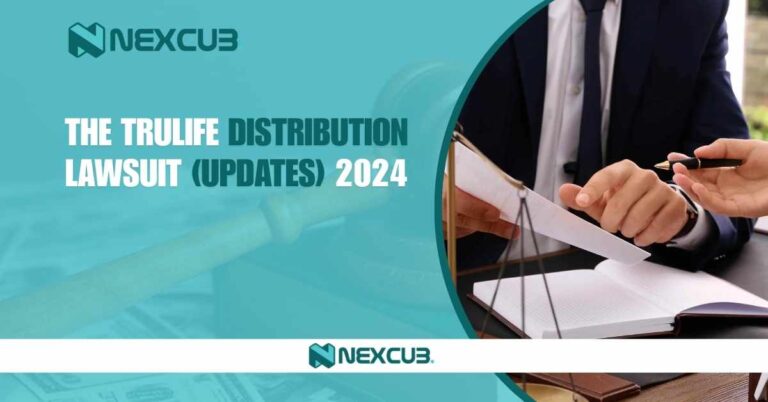Our Location
304 North Cardinal St.
Dorchester Center, MA 02124

The Trulife Distribution lawsuit has been making headlines in 2024, drawing attention from businesses and consumers alike. This high-profile case centers on allegations of deceptive practices, which have sparked debates over corporate accountability. With new updates emerging, understanding the lawsuit’s implications is more critical than ever.
Stay informed on the latest Trulife Distribution lawsuit updates to uncover what this case means for the industry and beyond.
The Trulife Distribution lawsuit gained traction in 2024 due to allegations of fraudulent business practices. Legal battles intensified as regulators and impacted clients accused the company of breaching ethical and legal standards. This case highlights concerns about corporate transparency and consumer rights, making it a landmark legal dispute in the distribution sector.
The Trulife Distribution case began with concerns raised by partners and customers over the company’s ethical practices. Over time, these concerns escalated into serious allegations, leading to a lawsuit in 2024. The case underscores the importance of corporate transparency and ethical operations in the competitive distribution industry. Its ongoing developments have sparked debates about business integrity and consumer rights.
The lawsuit includes allegations made by Nutritional Products International (NPI), which accused Trulife of unethical practices. NPI claims the company breached agreements, misused sensitive business data, and failed to meet contractual obligations, causing financial and reputational damage.
Trulife Distribution lawsuit has progressed through several legal phases since its inception. Initial complaints led to investigations by regulatory agencies and subsequent legal filings. The case highlights allegations of fraudulent practices and breaches of business ethics, drawing intense scrutiny from courts and stakeholders.

As of now, the case remains unresolved, with legal proceedings ongoing. The outcome could set a precedent for corporate accountability and impact the distribution industry significantly.
Trulife Distribution lawsuit has had far-reaching effects on the company, shaking its foundation in both reputation and operations. Allegations of unethical business practices and fraudulent activities have placed the company under intense scrutiny. As legal battles continue, Trulife is facing mounting challenges that threaten its position in the industry.
The lawsuit has severely damaged Trulife’s reputation, with negative media coverage and public criticism tarnishing its image. Partners and clients have distanced themselves from the company, leading to a loss of business opportunities.
Financially, the ongoing legal fees, potential settlements, and declining sales have created a significant burden. The allegations have also impacted investor confidence, making it harder for Trulife to secure funding or maintain stability in a competitive market.
The accusations of deceptive trade practices and misuse of proprietary information have eroded consumer trust. Customers now question the company’s integrity and reliability, leading to decreased loyalty and potential boycotts.
Competitors have leveraged the controversy to gain market share, further weakening Trulife’s position. Rebuilding consumer trust and repairing its market reputation will require substantial effort, transparency, and corrective actions if the company is to recover from this crisis.
Trulife Distribution lawsuit has sent shockwaves across the industry, raising concerns about ethical business practices and compliance. Competitors are closely watching the case, recognizing that similar allegations could arise in their operations.
This case has become a reminder that transparency and accountability are non-negotiable in today’s business landscape. The lawsuit has also drawn attention to the importance of adhering to consumer protection laws and maintaining integrity in marketing and operations.
The lawsuit highlights the critical role of regulatory compliance in safeguarding consumer rights. Authorities are now likely to increase scrutiny of distribution companies, ensuring they follow strict ethical and legal guidelines.
Trulife’s case underscores the consequences of deceptive trade practices and misuse of proprietary information, showing how such actions can lead to severe penalties and damage. It also serves as a wake-up call for companies to strengthen their compliance programs and prioritize ethical decision-making.
Businesses across industries can learn valuable lessons from Trulife Distribution lawsuit. Prioritizing ethical practices, maintaining transparency, and honoring commitments are essential for long-term success.
Companies should invest in robust compliance systems and regularly audit their operations to identify and address potential risks. Building consumer trust through honesty and reliability is crucial for maintaining a strong market position. Ultimately, this case serves as a cautionary tale about the risks of cutting corners in pursuit of short-term gains.

Trulife Distribution lawsuit has forced the company to address significant allegations while protecting its reputation. Facing claims of fraud, deceptive practices, and misuse of proprietary information, Trulife has been actively defending itself in court and the public eye.
The company is working to regain trust among its stakeholders, though the path to recovery remains challenging.
Trulife’s primary strategy has been to deny the allegations and highlight its commitment to ethical practices. In court filings, the company argued that many claims are exaggerated or based on misunderstandings.
Legal representatives for Trulife have focused on discrediting evidence presented by plaintiffs and whistleblowers. They have also emphasized the company’s history of compliance with industry regulations and pointed to internal policies designed to prevent misconduct.
By shifting the narrative, Trulife aims to minimize damage and potentially negotiate settlements to avoid prolonged litigation.
Trulife has issued multiple public statements addressing the lawsuit, aiming to reassure clients, partners, and the public. These statements stress the company’s commitment to resolving the matter fairly and maintaining its ethical standards.
Trulife also pledged to enhance its transparency efforts, including reviewing internal practices and increasing oversight. By announcing new measures, such as third-party audits and updated compliance training, the company hopes to rebuild consumer trust.
However, critics argue that these steps may be reactive rather than proactive, raising questions about whether they will truly restore confidence.
While Trulife continues its legal battle, its public image remains at stake. The company’s ability to handle this crisis with authenticity and accountability will determine its future in the competitive distribution market.
Trulife Distribution lawsuit could result in various outcomes, depending on how the court rules on the allegations. If Trulife is found guilty of deceptive practices or fraud, it could face significant financial penalties, including fines or damages to affected clients.
Additionally, the company may be required to revise its business practices to ensure compliance with legal and ethical standards. In a more favorable outcome, Trulife could negotiate a settlement, reducing the financial and reputational impact.
However, if the lawsuit is dismissed or the claims are disproven, the company may be able to recover its position and rebuild consumer trust.
The Trulife Distribution lawsuit highlights the importance of ethical business practices and compliance in today’s competitive market. While the outcome remains uncertain, the case serves as a cautionary tale for companies about the consequences of deceptive practices and misconduct.
Whether through legal action or settlement, the impact on Trulife’s reputation and operations is undeniable. Moving forward, businesses must prioritize transparency, accountability, and consumer trust to avoid similar legal challenges and protect their long-term success.